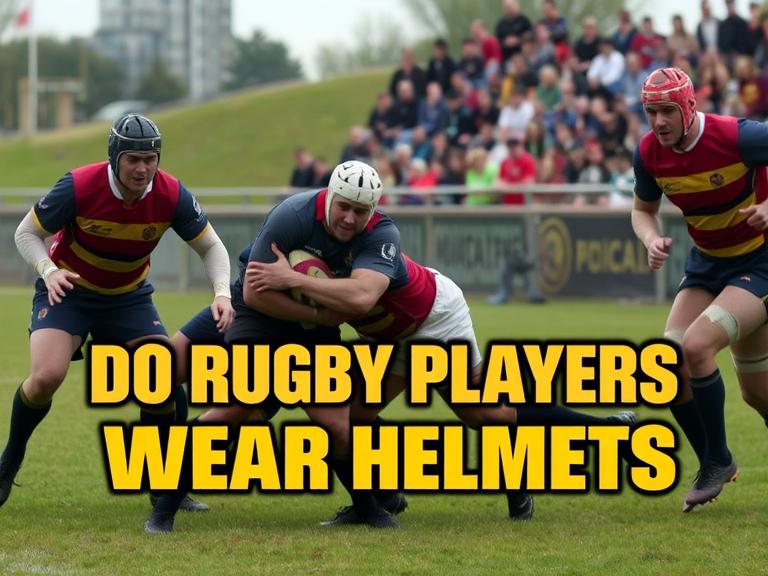Rugby is a high-impact sport known for its physicality and intensity. Unlike American football, where helmets are a standard part of the uniform, rugby has a different approach to player safety. A common question among new fans and players is: Do rugby players wear helmets? This article explores the use of helmets in rugby, why they are not as common as in other sports, and what protective gear players use instead.
Table of Contents
Why Don’t Rugby Players Wear Helmets?
Rugby is a sport built on tradition, and its rules emphasize player safety through technique rather than excessive padding. Here’s why helmets are not standard in rugby:
1. Different Tackling Techniques
In rugby, players are taught to tackle in a way that minimizes head injuries—using shoulder-led tackles and wrapping arms securely around opponents. Unlike American football, where high-speed collisions are frequent, rugby encourages controlled, safe contact.
2. Risk of Increased Aggression
Studies suggest that wearing helmets could lead to more aggressive play, as players might feel overly protected. Rugby’s philosophy focuses on reducing reckless behavior by keeping protective gear minimal.
3. Rules Against Hard Shell Helmets
World Rugby, the sport’s governing body, prohibits hard-shell helmets because they could cause injury to other players during scrums, rucks, and tackles.
What Protective Gear Do Rugby Players Wear?
While helmets aren’t common, rugby players do wear other protective equipment to reduce injury risks:
1. Scrum Caps (Soft Helmets)
Some players wear scrum caps, a type of soft helmet made of padded foam. These are not as rigid as football helmets but help protect against cuts, abrasions, and minor impacts.
Who Wears Scrum Caps?
- Forwards (especially in scrums)
- Players with a history of head injuries
- Those prone to ear injuries (e.g., “cauliflower ear”)
2. Mouthguards
Mouthguards are mandatory in rugby to protect against dental injuries and reduce concussion risks by absorbing shock.
3. Shoulder Pads & Chest Guards
Lightweight, padded shoulder protectors are allowed but must meet World Rugby’s safety standards.
4. Headgear in Women’s Rugby
Some women’s rugby teams experiment with padded headgear for added safety, though it’s not yet widespread.
Are Helmets Allowed in Rugby?
Technically, no—hard-shell helmets are banned in rugby. However, approved soft-shell headgear (like scrum caps) is permitted if it meets safety regulations.
World Rugby’s Stance on Helmets
- No rigid materials allowed
- Padding must not exceed 10mm thickness
- Gear cannot have straps or clips that could harm other players
Do Rugby Players Get Concussions Without Helmets?
Concussions are a concern in rugby, but studies show that helmets do not necessarily prevent them. Proper tackling technique, rule enforcement, and medical protocols play a bigger role in reducing head injuries.
How Rugby Addresses Concussions
- HIA (Head Injury Assessment): Players suspected of having a concussion must leave the field for evaluation.
- Strict Return-to-Play Protocols: Players cannot return the same day after a concussion.
FAQs About Rugby Helmets and Safety
1. Why do some rugby players wear headgear?
Some wear scrum caps to prevent cuts, ear damage, or due to previous injuries.
2. Can rugby players wear American football helmets?
No—hard-shell helmets are banned in rugby for safety reasons.
3. Do kids in rugby wear helmets?
Youth rugby follows the same rules—soft headgear is allowed, but not hard helmets.
4. Has rugby ever allowed full helmets?
No, rugby has always prioritized minimal protective gear to maintain the sport’s traditional style.
5. Are concussions common in rugby?
While they happen, rule changes and better training have reduced risks over time.
Conclusion
So, do rugby players wear helmets? The answer is no—at least not in the way American football players do. Rugby’s approach to safety relies on proper technique, controlled aggression, and approved soft padding rather than heavy helmets. While head injuries remain a concern, the sport continues to evolve with better protocols to protect players.
Whether you’re a player or a fan, understanding rugby’s unique safety measures helps appreciate why this thrilling sport remains helmet-free.




